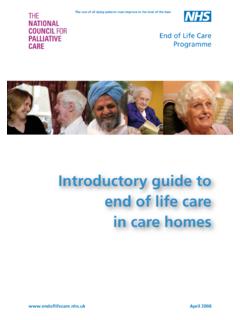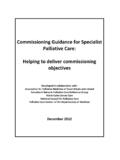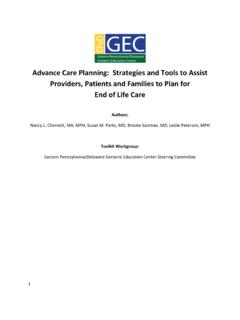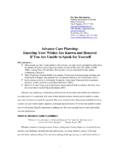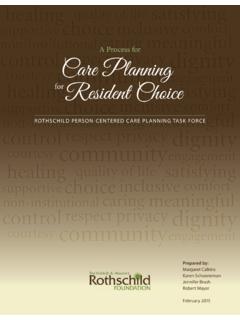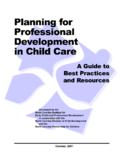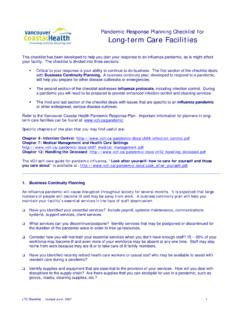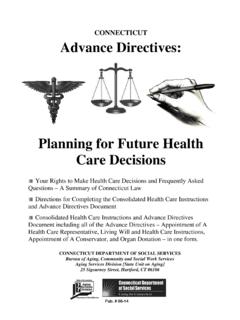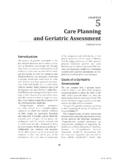Transcription of Advance Care Planning - NCPC
1 The care of all dying patients must improve to the level of the bestAdvance care Planning : A Guide for Health and Social care The care of all dying patients must improve to the level of the 1 Advance care Planning for adults affected by a life limiting conditionForewordCaring for people at the end of their lives is an important role for many health and social care professionals. One of the aspects of this role is to discuss with individuals their preferences regarding the type of care they would wish to receive and where they wish to be cared for in case they lose capacity or are unable to express a preference in the future. These discussions clearly need to be handled with skill and sensitivity. The outcomes of such discussions may then need to be documented, regularly reviewed and communicated to other relevant people, subject to the individual s agreement.
2 This is the process of Advance care Planning (ACP).This document highlights the key issues and challenges of incorporating ACP into patient care . It contains useful information on the key principles of ACP and on the definitions of ACP and related terms. It also indicates how ACP links to the Mental Capacity Act (2005).The document was initially developed as part of the three year (2004-2007) End of Life care Programme hosted by the NHS. I believe it is directly relevant to the End of Life care Strategy. I also believe that many health and social care professionals will find it useful in their clinical would like to thank all those who have contributed to the development of this document and especially Claire Henry, National Programme Director, NHS End of Life care Programme and Professor Jane Seymour, Sue Ryder care Professor of Palliative and End of Life Studies at the University of Mike Richards National Cancer DirectorThe care of all dying patients must improve to the level of the 2 Written, edited and revised byClaire Henry, National Programme Director, National End of Life care Programme and Jane Seymour, Sue Ryder care Professor of Palliative and End of Life Studies at the University of Nottingham, who have led this the purposes of this paper.
3 The individuals referred to will be adults affected by a life limiting care of all dying patients must improve to the level of the 31. Introduction and aimsThe area of Advance care Planning (ACP) is becoming increasingly important but can be confusing for health and social care professionals and the public. ACP has always been an intrinsic part of the NHS End of Life care Programme (EoLC); the Preferred Priorities for care (PPC) document is an example of this. Interest is growing, with more literature being published. The enactment of the Mental Capacity Act 2005 has highlighted the need for clarification and a national first edition of the document was initially developed as part of the three year (2004-2007) End of Life care Programme hosted by the feedback and debate the National End of Life care steering group met during 2006 and agreed that guidance relating to ACP was required for health and social care professionals which recognises their different contributions to an individual s were grateful for the opportunity to consult and discuss with key stakeholders and a wider reference group and address three objectives.
4 1 To clarify the definition of ACP and related terms 2 To provide practical guidance on core competences, education and training of different professional groups and related ethical and legal implications 3 To suggest next steps, to report on related work and suggest further workThe second edition of this document takes into account the implementation of the Mental Capacity Act 2005 which came into force in October 2007 along with the supporting Code of Practice. Chapter 9 of the Mental Capacity Act (MCA) 2005 Code of Practice refers specifically to Advance Decisions to Refuse Treatment and will be used as a guide to sections within this document that refer to Advance care Planning for adults affected by a life limiting conditionThe care of all dying patients must improve to the level of the 4 Advance care planningACP is a process of discussion between an individual and their care providers irrespective of discipline.
5 The difference between ACP and Planning more generally is that the process of ACP is to make clear a person s wishes and will usually take place in the context of an anticipated deterioration in the individual s condition in the future, with attendant loss of capacity to make decisions and/or ability to communicate wishes to the individual s agreement, discussions should be: documented regularly reviewed communicated to key persons involved in their care . If the individual wishes, their family and friends may be of what an ACP discussion might include are: the individual s concerns their important values or personal goals for care their understanding about their illness and prognosis, as well as particular preferences for types of care or treatment that may be beneficial in the future and the availability of of wishes and PreferencesThis is a summary term embracing a range of written and/or recorded oral expressions, by which people can, if they wish, write down or tell people about their wishes or preferences in relation to future treatment and care , or explain their feelings, beliefs and values that govern how they make decisions.
6 They may cover medical and non-medical matters. They are not legally binding but should be used when determining a person s best interests in the event they lose capacity to make those decisionAn Advance decision must relate to a refusal of specific medical treatment and can specify circumstances. It will come into effect when the individual has lost capacity to give or refuse consent to assessment of the validity and applicability of an Advance decision is essential before it is used in clinical practice. Valid Advance decisions, which are refusals of treatment, are legally Power of AttorneyA Lasting Power of Attorney (LPA) is a statutory form of power of attorney created by the MCA (2005). Anyone who has the capacity to do so may choose a person (an attorney ) to take decisions on their behalf if they subsequently lose care PLANNINGSTATEMENT of wIShES & PREfERENCESADVANCE DECISIoNThe care of all dying patients must improve to the level of the 52.
7 Advance care DefinitionAdvance care Planning (ACP) is a voluntary process of discussion about future care between an individual and their care providers, irrespective of discipline. If the individual wishes, their family and friends may be included. It is recommended that with the individual s agreement this discussion is documented, regularly reviewed, and communicated to key persons involved in their care1. An ACP discussion might include: the individual s concerns and wishes, their important values or personal goals for care , their understanding about their illness and prognosis, their preferences and wishes for types of care or treatment that may be beneficial in the future and the availability of Role of ACP in supportive careIf an individual wishes, ACP may be an integral part of the care and communication process and of their regular care plan review.
8 The difference between ACP and care Planning more generally is that the process of ACP will usually take place in the context of an anticipated deterioration in the individual s condition in the future, with attendant loss of capacity to make decisions and/or ability to communicate wishes to Documentation of ACPT here is no set format for making a record of Advance care Planning discussions, although having a person s wishes documented will prove helpful to those involved in their future care . Professionals who support a person in Advance care Planning should try to avoid following a rigid prescriptive method of interview and recording of discussions, this can be achieved by using an open question style of ACP and the MCAFor individuals with capacity it is their current wishes about their care which needs to be considered.
9 Under the MCA of 2005, individuals can continue to anticipate future decision making about their care or treatment should they lack capacity. In this context, the outcome of ACP may be the completion of a statement of wishes and preferences or if referring to refusal of specific treatment may lead onto an Advance decision to refuse treatment (Chapter 9 MCA 2005 Code of Practice). This is not mandatory or automatic and will depend on the person s wishes. Alternatively, an individual may decide to appoint a person to represent them by choosing a person (an attorney ) to take decisions on their behalf if they subsequently lose capacity (Chapter 5 MCA 2005 Code of Practice).A statement of wishes and preferences is not legally binding. However, it does have legal standing and must be taken into account when making a judgement in a person s best interests.
10 Careful account needs to be taken of the relevance of statements of wishes and preferences when making best interest decisions (Chapter 5 MCA 2005 Code of Practice).If an Advance decision to refuse treatment has been made it is a legally binding document if that Advance decision can be shown to be valid and applicable to the current circumstances. If it relates to life sustaining treatment it must be a written document which is signed and Guidance on communication is contained in the Improving Supportive and Palliative care Guidance NICE 2004 The care of all dying patients must improve to the level of the 6In all cases, an individual s contemporaneous capacity must be assessed on a decision-by-decision basis. An individual may retain the ability to make a simple decision but not more complex decisions (Chapter 4 MCA 2005 Code of Practice).

